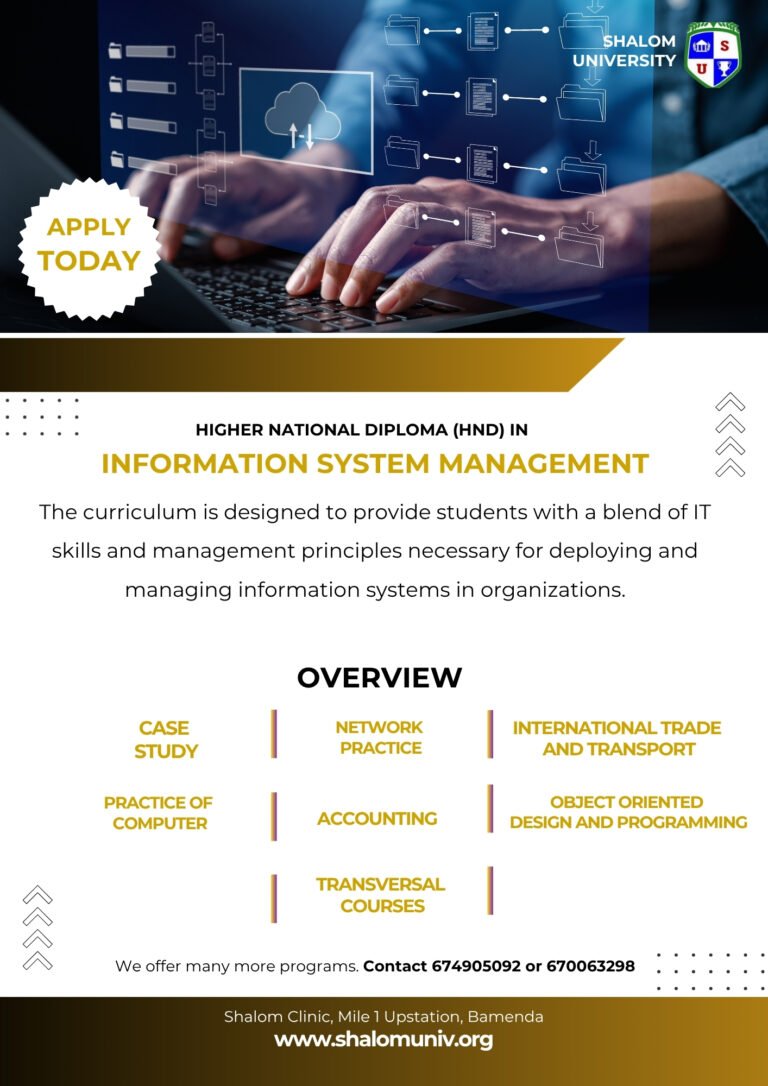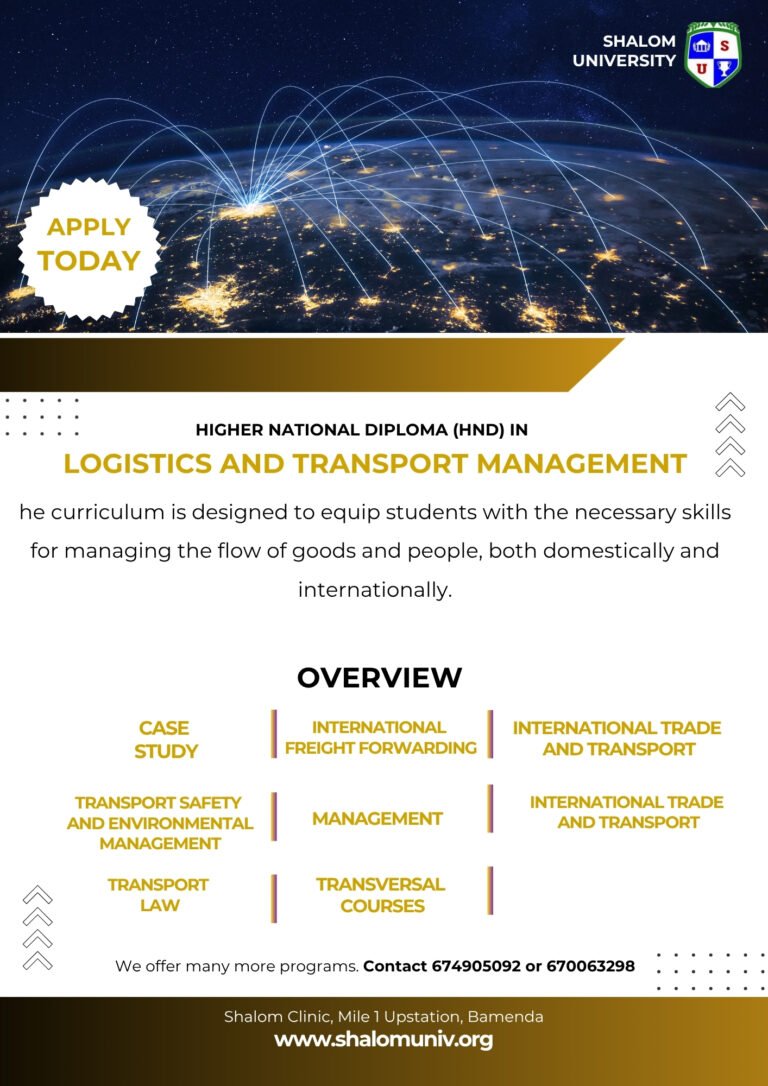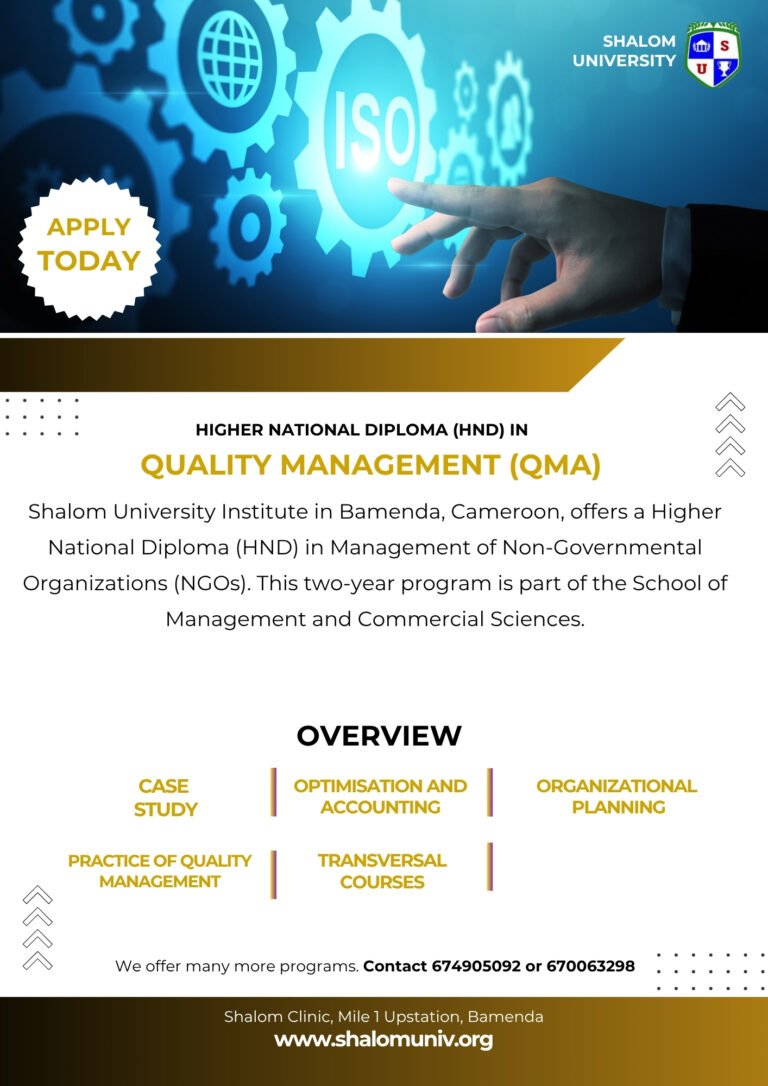Non-Governmental Organizations (NGOs) play an indispensable role in Cameroon’s development landscape, tackling critical issues from public health and education to environmental conservation and humanitarian aid. Effective management is paramount for these organizations to achieve their missions and ensure sustainable impact in the communities they serve. Recognizing this vital need, Shalom University in Bamenda offers a Higher National Diploma (HND) in Management of Non-Governmental Organizations. This specialized program is designed to equip students with the unique managerial skills required to lead, operate, and sustain NGOs within the specific context of Cameroon.
The curriculum at Shalom University blends theoretical knowledge with practical application, focusing on the specific challenges and opportunities faced by NGOs in Cameroon. Graduates are prepared to navigate project cycles, analyze community needs, manage risks, and leverage information systems, making them highly valuable assets to the country’s vibrant NGO sector.
The NGO Management Curriculum at Shalom University
The HND in Management of Non-Governmental Organizations program at Shalom University is structured around a set of core papers that provide a comprehensive and practical education in this specialized field.
Paper: Case Study
The Case Study paper is a vital component that integrates all the theoretical knowledge and technical skills gained throughout the program. It challenges students to analyze complex scenarios faced by NGOs, from navigating funding challenges to managing community projects. This is particularly relevant for NGO managers in Cameroon, who must often adapt to dynamic political, social, and economic environments, as well as donor requirements.
The course trains students to:
- Analyze real-world NGO challenges: Based on a given case, students must evaluate operational, financial, and programmatic challenges faced by an NGO working in Cameroon.
- Identify strategic and tactical issues: They pinpoint specific problems related to project implementation, fundraising, risk management, or organizational governance within the NGO context.
- Propose evidence-based solutions: Students formulate practical recommendations based on NGO best practices, project management principles, and contextual knowledge. For example, a case study might involve an NGO struggling with project sustainability after initial donor funding ends, requiring a proposal for alternative funding mechanisms or community ownership models.
- Defend their decisions: During formal presentations, students must justify their analysis and proposed solutions, demonstrating their critical thinking and communication skills, which are essential for reporting to stakeholders and making internal decisions.
Paper: Project Management
Effective project management is the backbone of successful NGO operations. This paper provides students with the methodological framework and practical tools needed to design, implement, monitor, and evaluate projects that achieve their intended impact within target communities. This is crucial for NGOs operating in Cameroon, where projects often address complex development challenges.
Key topics include:
- Project Cycle Management: Understanding the phases of a project, from identification and formulation to implementation, monitoring, evaluation, and closure.
- Stakeholder Analysis: Identifying and engaging with key stakeholders, including communities, government bodies, donors, and partners, which is essential for ensuring project relevance and success in Cameroon.
- Logical Framework Approach (LFA): Using the LFA or similar tools for project planning, setting clear objectives, indicators, and assumptions.
- Work Plan Development: Creating detailed work plans, timelines, and resource allocation strategies.
- Monitoring and Evaluation (M&E): Designing and implementing M&E systems to track project progress, measure impact, and ensure accountability to beneficiaries and donors.
Paper: Market Analysis and Management of Risks
While NGOs are non-profit, they operate in a competitive environment for funding and require strategic positioning. Furthermore, they face unique risks that must be carefully managed to ensure organizational sustainability and project success. This paper equips students with the skills to understand their operating environment and mitigate potential threats.
The curriculum covers:
- Donor Landscape Analysis: Identifying potential funding sources (e.g., international aid agencies, foundations, corporate social responsibility programs) and understanding their priorities and requirements.
- Needs Assessment and Program Design: Conducting thorough needs assessments in communities and designing programs that are responsive to local contexts and donor interests.
- Fundraising Strategies: Developing effective strategies for grant writing, proposal development, and cultivating donor relationships, adapting to the nuances of fundraising within Cameroon.
- Risk Identification and Assessment: Identifying various types of risks faced by NGOs (e.g., financial, operational, political, security, reputational) relevant to the Cameroonian context.
- Risk Mitigation and Management: Developing and implementing strategies to prevent, reduce, or respond to identified risks, ensuring the safety of staff and the continuity of programs.
Paper: Information System and Accounting
Efficient information management and robust financial accountability are critical for the credibility and effectiveness of any NGO, particularly when dealing with donor funds and complex project budgets. This paper provides students with the necessary skills in both areas.
Key areas of focus include:
- Information Management Systems: Introduction to various information systems used by NGOs for data collection, project tracking, beneficiary management, and reporting.
- Data Analysis and Reporting: Using information systems to analyze program data, generate reports, and communicate results to stakeholders, ensuring transparency and accountability.
- NGO Accounting Principles: Specific accounting standards and practices applicable to non-profit organizations, including fund accounting and grant accounting.
- Budgeting and Financial Controls: Developing project budgets, managing expenditures, and implementing internal controls to ensure responsible use of funds.
- Financial Reporting and Auditing: Preparing accurate financial statements and understanding the requirements for external audits, which are essential for donor compliance and demonstrating integrity.
Leaders for Social Impact
Graduates of the HND in Management of Non-Governmental Organizations from Shalom University are well-prepared to take on leadership and administrative roles within the NGO sector in Cameroon. They can serve as Project Coordinators, Program Officers, Monitoring and Evaluation Specialists, Fundraising Managers, or Administrative Managers. Their specialized training in project management, risk analysis, information systems, and accounting, coupled with a deep understanding of the NGO landscape in Cameroon, makes them invaluable assets to organizations striving for social impact. The Case Study paper ensures that they are not just theoretically sound but also adept at applying their knowledge to solve real-world challenges and navigate the complexities of NGO management. By providing practical and contextually relevant education, Shalom University plays a significant role in strengthening the capacity of Cameroon’s NGO sector, ultimately contributing to the nation’s sustainable development goals.




